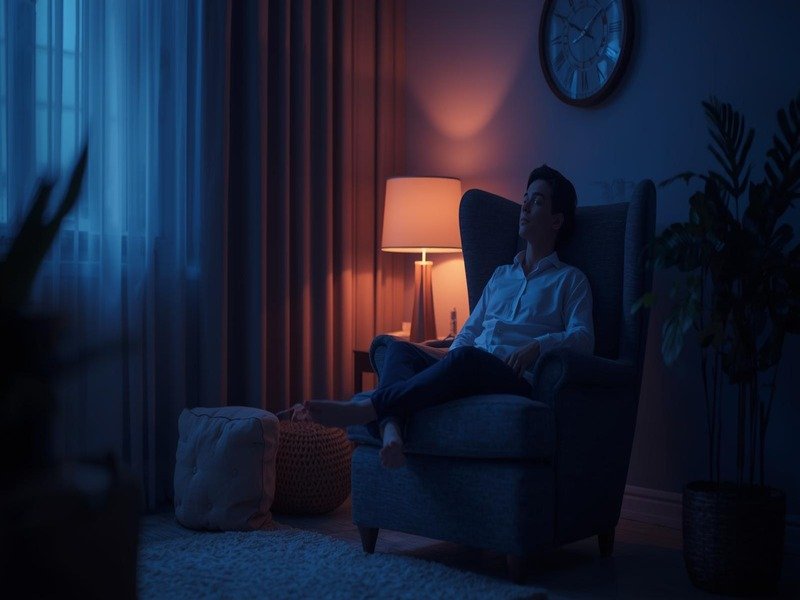It’s 2 AM. You’re lying in bed, your eyes wide open. Your body is tired, but your mind refuses to rest.
Insomnia and night anxiety have quietly become a collective experience. In a world dominated by screens, digital demands and constant connectivity, our nervous systems are overstimulated long after the sun goes down.
We scroll endlessly, chase deadlines across time zones and substitute real human connection with digital interactions. The result? A restless mind, an anxious heart and a body that forgets how to relax.
Causes of Insomnia & Night Anxiety
Overthinking & Emotional Stress
In today’s fast-paced world, we’ve unconsciously trained ourselves to suppress emotions and ignore our inner thoughts. Constant overthinking has become the norm, leaving our minds restless and overstimulated especially at night. Instead of winding down, the brain stays in overdrive, making deep relaxation and peaceful sleep feel out of reach.
Unprocessed Thoughts, Past Incidents, Trauma
The mind has a way of circling back to unresolved experiences, traumas, emotional wounds and moments we never had the space to fully process. Until these inner echoes are acknowledged and released, the mind remains uneasy, often manifesting as chronic restlessness.
Silent Weight of Modern Life and Shifting Roles
Many women, for instance, face immense stress during early marriage while navigating new roles, expectations and emotional shifts. At the same time, men often carry the weight of professional pressures and societal demands. And in today’s evolving world, women are not only managing homes but also building careers, striving for growth in both personal and professional spheres.
A double load of stress, with little time or space to pause, reflect or heal. Emotional processing gets sidelined and the body begins to speak through sleep disturbances
Hormonal Imbalances
When hormones fall out of balance, sleep is often the first casualty. Cortisol, melatonin, oestrogen, progesterone and even thyroid hormones play a delicate role in regulating our sleep-wake cycles. It isn’t just poor sleep, it’s your body signalling a deeper imbalance.
Mind and Body Are Not Separate
Most sleep problems aren’t just physical, they’re deeply connected to your subconscious mind. Modern research increasingly reveals the profound connection between mind and body.
Physical pain, discomfort or chronic illness often reflects what’s happening in our inner thought space. By addressing emotional and mental patterns, true healing becomes not only possible but sustainable.
Hypnosis vs. Other Sleep Solutions
- Sleeping pills provide temporary relief but often with side effects.
- Meditation is powerful, but requires consistent long-term practice.
- Hypnosis, however, allows direct access to the subconscious, accelerating transformation and delivering lasting results.
Hypnosis is:
- A natural, focused state of awareness
- A process that dissolves stressors and emotional triggers
- A way to reprogram sleep-related patterns for deep rest
Hypnosis improves sleep by
- Releasing Emotional Triggers: dissolves the knots of anxiety and stress.
- Accessing the Subconscious Mind: rewires old, ingrained patterns that keep you awake.
- Rewiring for Rest: retrains the nervous system to find calm and balance.
When to Seek Support
If you’re facing persistent insomnia, recurring night terrors or emotional fatigue that drains your days, it may be time to seek help. Professional guidance ensures your subconscious is healed safely and effectively.
This is where our trusted Hypnotherapy Centre in Lucknow can play a transformative role. Here, clients receive personalised sessions designed to uncover emotional triggers, reset the subconscious and reintroduce the body to its natural rhythm of rest.
But healing isn’t only about sleep but also about life balance. Many clients also complement hypnotherapy with holistic practices. Attending our spiritual retreats in Lucknow provides a nurturing escape from daily stress, helping individuals reconnect with themselves on a deeper level. Similarly, choosing our wellness and yoga centre in Lucknow can harmonise body and mind through breath-work, mindful movement and restorative practices that support long-term emotional well-being.
FAQs About Hypnotherapy for Sleep
- Does hypnosis really work for insomnia?
Yes. It addresses core issues, retrains your mind and supports natural rest. - How many sessions are needed?
On average, 5–6 sessions show remarkable improvement, though individual needs vary. - Can I try hypnosis at home?
It’s best to work with a certified professional for tailored guidance.
Final Word
Sleepless nights aren’t just a nuisance, they’re your body’s way of asking for balance. Through hypnosis, you can retrain your mind, release emotional baggage and rediscover the deep rest your body already knows how to find.
The journey to better sleep begins with one decision, to finally listen to what your mind and body have been asking for all along.
Onwards and upwards
Team Happiness SOULutions
Website: www.happinesssolutions.com

